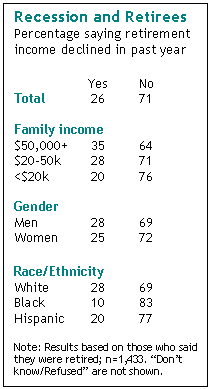When asked to think about how they will finance their retirement, Americans of all ages are of two minds. Fully seven-in-ten say they are very (30%) or somewhat (41%) confident that they will have enough income and assets to last throughout their retirement years. At the same time, however, two-thirds of all adults (and 75% of everyone ages 50 to 64) say that the nation’s current economic problems will make it harder for them to take care of their financial needs in retirement.

Perhaps not surprisingly, a person’s confidence in his or her ability to afford retirement is correlated with how much money he or she has lost in a retirement account or in other investments in the past year.
About half of all adults lost money on their stocks, bonds, mutual funds or retirement accounts in the past year. Groups most likely to have seen their next eggs shrink include whites, higher-income adults and better educated adults — not surprising, since these demographic groups are more likely to have investment holdings in the first place.
Among those who lost money, nearly two-thirds (64%) saw the value of their investments decline by 20% or more, including nearly one-in-five (18%) who lost more than 40%. Affluent and not-so-affluent investors were equally hard hit on a proportional basis. While the better-off adults are more likely to have investments, among all investors who lost money, about 20% of individuals with family incomes of under $50,000 lost 40% of their holdings, as did those with incomes of $100,000 or more.
Overall, the survey finds that investment losses affected worries about retirement — but in a subtle way. People who lost money in stocks, mutual funds or retirement accounts are more confident that they will have enough money to live comfortably in their retirement years than are people who didn’t lose money (76% vs. 68%).
This somewhat surprising finding has a straightforward explanation. As the survey has shown, those adults with higher incomes are more confident about their retirement finances. This group also is significantly more likely to have money invested in stocks, bonds and retirement accounts — and to have watched in dismay as the value of these investments fell in recent months. According to the survey, nearly eight-in-ten adults with family incomes of $100,000 or more report that the value of their investment holdings declined, compared with 22% of those earning less than $30,000. The result is that a larger percentage of financially better-off adults have lost money in the market and yet remain very confident that they will have enough to get by in old age, perhaps because they still have enough left for retirement or expect to recoup their losses.
But regardless of income, the bigger the losses, the bigger the doubts that people have about being able to finance their retirement. According to the survey, barely six-in-ten (61%) adults who lost more than 40% in the past year say they are confident they have enough money to live on in retirement, compared with 83% of those who lost less than 20%. Predictably, those who lost between 20% and 40% fall roughly in the middle: 78% expect to have the financial resources to make it through their retirement years.
But the relationship between the size of investment losses and financial confidence is not quite as straightforward as these results may suggest. Those who did not lose any money in stocks, bonds or retirement accounts were only somewhat more confident about their financial futures in retirement than those who experienced the greatest losses (69% vs. 61%). Those who did not lose money also are significantly less confident about their financial security in retirement than are those who suffered less dramatic losses.
Income levels explain this uneven pattern. Those who lost no money on investments have substantially lower average family incomes than those who experienced investment losses (roughly $42,000 vs. $76,000). While the survey did not ask people if they had invested in stocks, bonds, mutual funds or had a retirement account, other research shows that those with higher incomes are more likely to have such investments and be more positive about their future in retirement.
Retirement and Recession

Despite recession losses, Americans remain confident about their financial retirement. While two-thirds of all adults say their retirement nest egg has diminished in value, an even larger majority (71%) remains confident that they will have enough income and assets for old age.
The Threshold Generation is the least optimistic. Among those ages 50 to 64, about two-thirds (65%) are confident that they have enough money to make it through retirement. Younger adults are the most optimistic, perhaps because they have many years left to erase the effects of the current recession. Three-quarters (76%) of adults under 30 are confident they will have enough for retirement, while nearly as many (73%) 30- to 49-year-olds and those 65 or older agree. Not surprisingly, adults with higher incomes are significantly more confident than those with lower incomes. Nearly nine-in-ten adults with family incomes of $100,000 or more (88%) express confidence about their retirement finances, compared with 59% of those with family incomes of less than $30,000.
Retirement Income Takes a Hit
About a quarter of all adults, including eight-in-ten seniors, say they are retired. Among this group, about one-in-four (26%) say their retirement income declined in the past year.
Retirees with relatively higher family incomes are the most likely to say their incomes dropped, in large part because this group is the most likely to have investment portfolios that were affected by the plunging stock market. Slightly fewer than three-in-ten older Americans have incomes of $50,000 or more, and of this group, slightly more than a third report that their retirement income declined last year. In contrast, one-in-five of those with incomes below $20,000 — about 31% of all older adults — saw their earnings decline.




